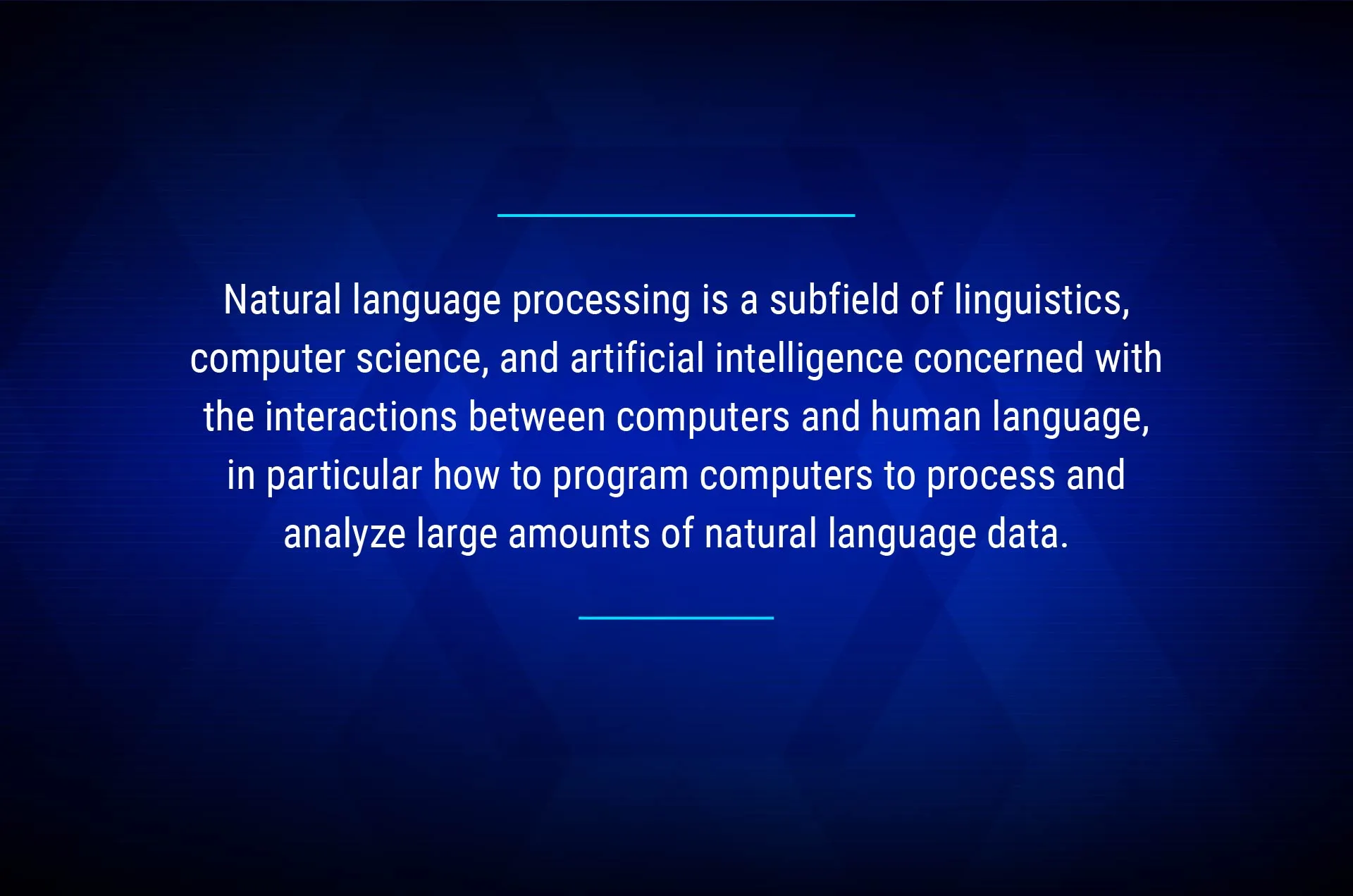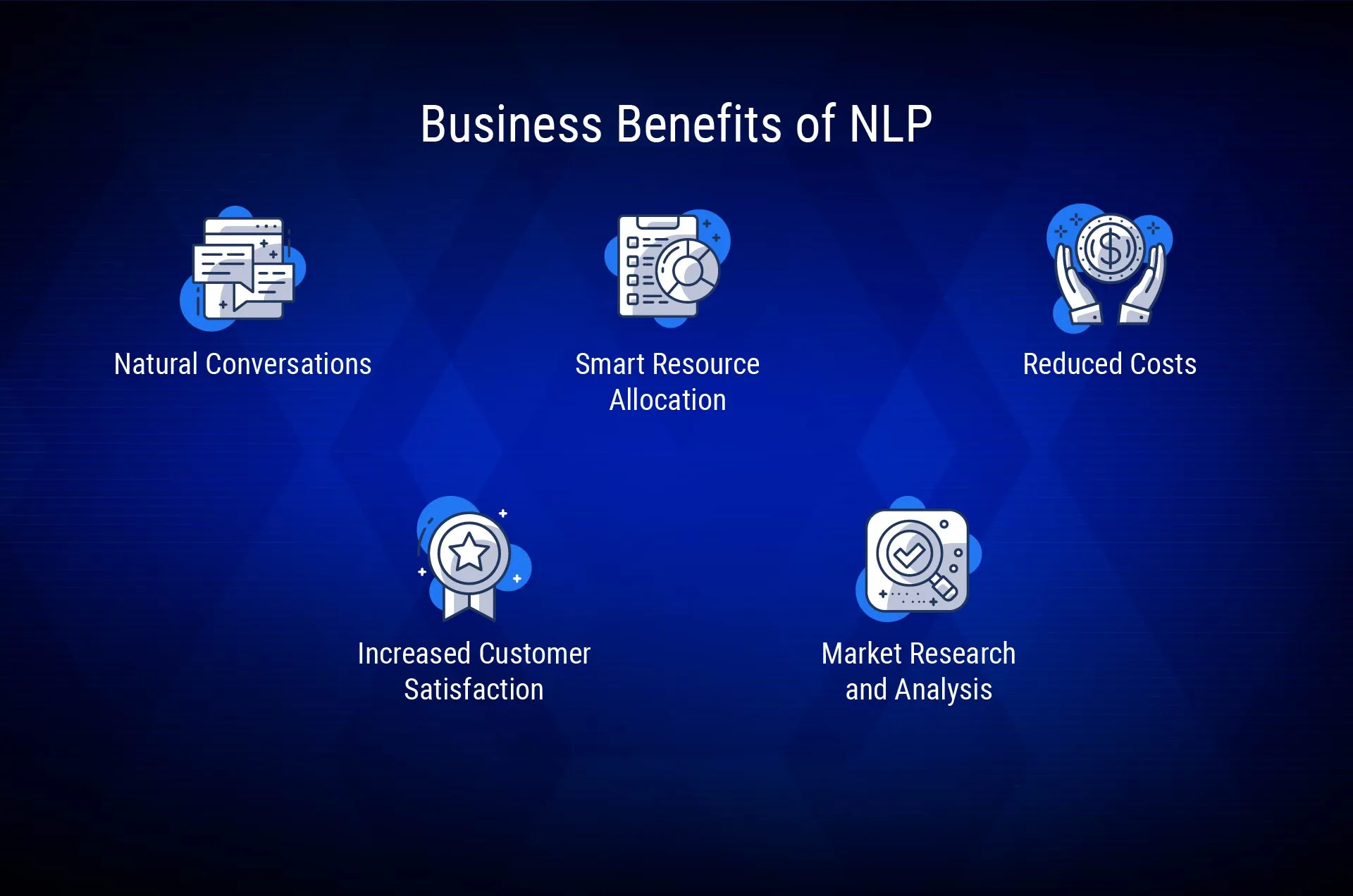What Is Natural Language Processing and How Does It Help to Grow Your Business?
Table of contents
- What Is Natural Language Processing?
- Key tasks of NLP
- Sentence segmentation, part-of-speech tagging, and parsing
- Deep analytics
- Machine translation
- Named entity extraction
- Coreference resolution
- Automatic summarization
- Business Benefits of NLP
- Natural Conversations
- Smart Resource Allocation
- Reduced Costs
- Increased Customer Satisfaction
- Market Research and Analysis
- Leveraging NLP for Different Industries: Real-Life Use Cases
- Healthcare
- Financial Services
- Retail
- The Bottom Line
Although natural language processing, also known as NLP, is not something new, in recent years, the technology has dramatically increased in popularity. Complemented with other techs and tools, including Big Data, cloud computing, machine learning, and enhanced analytical algorithms, NLP literally does wonders in terms of human-to-machine communication, making it easier, faster, more natural, satisfying, and results-productive.
One of the first examples that comes to mind in this regard is Siri interpreting your words to provide you with the needed answers. And it’s not that simple as it seems: the device has to activate after recognizing your speech, understand the meaning behind your words, and respond with feedback in a well-formed sentence. So how does the machine manage to do it? What is NLP, what does it offer, and how is it already used in different industries? Let’s dive deeper into the notion of NLP to find answers.
What Is Natural Language Processing?
Not so long ago, it didn’t really matter if you spoke English, Russian, Hebrew, Italian, Portuguese, etc. — computers were able to understand only those who had command of the language made up of millions of zeros and ones, and this was a relatively small number of people. But things have changed, and today, with a developing branch of artificial intelligence — natural language processing — the communication between humans and machines is greatly facilitated. Considering this, NLP can be defined as a bridge that fills the gap between human communication and computer understanding. Wikipedia defines NLP as follows:

So the next question to be answered is what NLP is used for.
Key tasks of NLP
There are six general tasks NLP algorithms complete. These are:
Sentence segmentation, part-of-speech tagging, and parsing
For the understanding of the grammatical construction of sentences
Deep analytics
For the extraction of specific information from large or multi-source data sets
Machine translation
For the translation of one human language to another one
Named entity extraction
For data mining by name, age, location, phone number, or other attributes
Coreference resolution
For the determination of words that refer to the same subject
Automatic summarization
For the production of summaries from larger texts
Each of the tasks NLP algorithms complete can be quite useful when applied to deal with certain business challenges. To provide you with a clearer picture of what NLP has on offer, we’ve collected the list of key advantages of the technology.
Business Benefits of NLP
Because one of the most commonly used forms of NLP in business is represented by chatbots, the listed below examples contain the referring information. Generically, there are 5 key benefits that businesses expect to reap from the implementation of NLP into their processes. These are:

Natural Conversations
NLP does not just open up space for the understanding of human language and speech structures to machines. It is also capable of recognizing idioms and slang, determining the appropriate meaning for each word. In this way, the NLP technology ensures natural, easy conversations between humans and machines. Furthermore, when it comes to the chatbot technology, it has the potential to learn from previous experiences, meaning that it becomes smarter and more accurate each day.
Smart Resource Allocation
NLP is widely used for repetitive tasks, and for good reason. It turns out to be a great benefit for business owners when the ‘trained’ technology performs certain little tasks, while human operators can focus on mission-critical ones. In other words, having a chatbot that deals with repetitive tasks means having an opportunity to allocate valuable human resources in the most effective way.
Reduced Costs
One of the greatest benefits of NLP to business lies in the ability of the technology to facilitate manual and repetitive tasks. In terms of budgeting, its implementation leads to reduced costs achieved through streamlined operations and overall business efficiency.
Increased Customer Satisfaction
With the growing demand among customers for immediate and useful feedback, NLP has become one of the greatest solutions. The technology provides the ability for simultaneous human-to-human-like conversations, decreasing inefficiency, and promoting a higher level of customer satisfaction.
Market Research and Analysis
NLP is not just about processing information but also about receiving it. In this way, it becomes a rich source of data that can be used for market research purposes and analysis.
Leveraging NLP for Different Industries: Real-Life Use Cases
There’s no better way to track the technology’s potential than to see how it is used in different industries. Below, we’ve selected three industries leveraging NLP to show you its real-life use cases.
Healthcare

The first thing that comes into mind when talking about NLP in healthcare is medical chatbots that help physicians with pre-diagnostics and, through the analysis of answers given by a patient, determine if they have to schedule an appointment to their physician. Such chatbots are Florence health assistant, CancerChatbot, mental health Woebot, and many others.
Nevertheless, the potential of natural language processing in medicine is not limited by chatbot applications. NLP can also process information stored in electronic health records to discover previously missed or improperly coded patient conditions, in this way helping physicians with faster and more accurate diagnosis and treatment.
Financial Services
With the NLP algorithms implemented into banking applications, businesses get the opportunity to automatically assess a credit applicant’s risk as well as to discover what their customers think about products and services on offer through sentiment analysis. So the financial sector today is one of those areas benefiting most from NLP. It leverages such types of applications as credit scoring for underbanked clientele, applications for sentiment analysis, document search apps, and others.
One of the real-life examples of NLP apps in financial services is LenddoScore developed for a Singapore-based company LenddoEFL. Through the analysis of information from social media, internet browsing history, geolocation data, and other smartphone information, the app helps in accessing an individual’s creditworthiness.
Retail
In retail, the use of NLP is largely represented by customer-facing chatbots aimed at providing interactive customer service experience. In this way, technology helps retailers automate certain types of work and free employees from doing it as part of their normal responsibilities.
Cloudminds, a company that offers conversational interfaces to retailers, has two solutions on offer: a robot answering customer’s questions via voice and a virtual assistant that offers help at various in-store touchscreen interfaces.
The Bottom Line
As for today, many companies are still managing to operate brightly without the implementation of NLP applications. Nevertheless, as the amount of received unstructured data grows, solutions capable of processing it also grow in demand. So it won’t be an exaggeration to say that companies that have already adopted NLP are not just becoming more efficient but also more prepared for the heavy data future. Furthermore, with the NLP algorithms offering more personalized, better quality services, their beneficial impact to business can not be neglected.
Whether you are just curious about the ways NLP algorithms can help your business grow and expand, or you have already decided on the development of such a solution, feel free to contact us for a free consultation. At Emerline, we have experience of working with machine learning and NLP algorithms and are enthusiastic about implementing them into the business strategies of our clients.
Published on Sep 18, 2020





